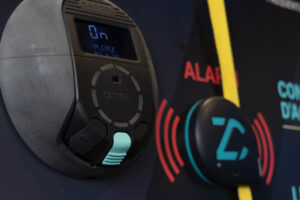
An innovative seawater irrigation system without filtration or desalination for agriculture and gardening
June 16, 2025
UPCxels: Open and Multisectoral Data Space Based on Artificial Intelligence
June 20, 202519/06/2025
A multidisciplinary research team led by the Intelligent Data sciEnce and Artificial Intelligence Research Group (IDEAI-UPC) at the Universitat Politècnica de Catalunya - BarcelonaTech (UPC) is participating in the Agrixels project, which aims to create an agricultural information standard—essentially, a data ecosystem—designed for AI-based services in the agri-food sector.
Agrixels defines two use cases within the sector: the first focuses on the climate and environmental sustainability of farms, while the second addresses an environmental externality of interest: the carbon market.
In the face of environmental and climate challenges, the pressure to optimise natural resources, and the unstoppable pace of digitalisation, many actors in the sector struggle to share, analyse and harness information in an efficient and integrated way.
In this context, Agrixels aims to promote the development, deployment and parameterisation of the interoperable Agríxel standard, integrating data from multiple sources and applying advanced AI-based services, under a transparent and secure data governance model. The standard comprises a set of common rules that enable land-related data to be shared and interpreted easily across systems, applications and organisations — regardless of the data source or software used. This approach supports better-informed decision-making, facilitates data exchange among stakeholders, and strengthens competitiveness through innovative public-private governance and collaboration models.
The project focuses on two main use cases: climate sustainability of open-air crops and the environmental impact of agricultural exploitations, specifically carbon footprint quantification and reduction. Both cases are validated through two services that represent real-world applications built on AI-based models and methods, effectively deployed in a demonstration centre.
The Agríxel technical proposal is based on international Open Geospatial Consortium (OGC) standards for agrogeoinformatics, ensuring that the data are findable, accessible, interoperable and reusable (FAIR).
The Agríxel standard organises information into 1m x 1m geographic pixels using the Cartographic Orientation System (SOC). These pixels are imaginary squares dividing the land into real one-square-metre sections. Each pixel contains specific data, such as crop type, soil moisture, temperature, or air quality. This structure enables high-resolution analysis of land, comparison between zones, pattern detection, and more precise and efficient decision-making in the agri-food domain.
The standard is based on the version of OGC standards most compatible with the SOC system, and is adapted to integrate multiple layers of information, including: weather data (climate, rainfall, temperature), crops (varieties, sowing data), soil (moisture, irrigation needs), plant health (pests, diseases, phytosanitary status), harvest and quality (yield, traceability, product characteristics), and commercialisation (distribution, prices, market data). This approach supports advanced analytics and the inclusion of key variables for sustainability and circularity, such as carbon footprint, water use, energy, and logistics.
Moreover, its universal standardisation allows it to be a scalable and adaptable solution across different regions and geographical scales over time.
Impact
The Agrixels project will have a direct and positive impact on the agri-food sector by improving production efficiency and sustainability, public management, and research. It will also provide high-quality data for companies, control and planning tools for public administrations, and an open platform for scientific and technological innovation — helping to optimise resources, reduce costs, and improve the sustainability of production.
Budget and Funding
The project involves more than thirty-five entities, including public administrations, cooperatives, companies, technology centres and ICT organisations. In addition to IDEAI-UPC, Agrixels involves the following research groups and centres from UPC: Horticulture: Production, Processing and Utilisation (HorPTA), Instrumentation, Sensors and Interfaces Group (ISI), CER Agrotech-UPC, Wireless Networks Group (WNG), Design and Evaluation of Broadband Networks and Services (BAMPLA), CommSensLab-UPC, and the Centre for Advanced Technologies in Mechanics (CATMech).
It has received funding of € 2,418,035 under the Recovery, Transformation and Resilience Plan of the Ministry of Digital Transformation and Public Function (Government of Spain), and will run for 14 months (November 2024 – December 2025).
More information: https://agrixels.upc.edu
You want to know more?
Related Projects
- The Visualisation, Virtual Reality and Graphic Interaction Research Group (ViRVIG) at the Universitat Politècnica de Catalunya - BarcelonaTech (UPC) has participated in the XR4ED project, an initiative that connects the educational technology (EdTech) and Extended Reality (XR) sectors, with the aim of transforming learning and training across Europe.
- The inLab FIB at the UPC has collaborated with Lizcore® for the development of a proof of concept based on artificial intelligence to improve safety in climbing with autobelay devices. The system allows the automatic and accurate detection of risk situations before starting a route.
- Researchers from the Centre for Image and Multimedia Technology of the UPC (CITM) and from the DiCode research group (Digital Culture and Creative Technologies Research Group) of the Universitat Politècnica de Catalunya – BarcelonaTech (UPC) have worked on the project The Eyes of History, an initiative of the Catalan Agency for Cultural Heritage that offers an immersive view of Catalan cultural heritage. It is especially aimed at the first and second cycles of secondary education and was created to bring heritage into the classroom. Its goal is to bring the history and monuments of Catalonia closer in a vivid and innovative way, using tools such as virtual reality and new museographic narratives.
- City and Play is a social action project coordinated by researchers from the Centre for Image and Multimedia Technology (CITM) and the DiCode research group (Digital Culture and Creative Technologies Research Group) of the Universitat Politècnica de Catalunya – BarcelonaTech (UPC), the Universitat Oberta de Catalunya (UOC) and the University of Barcelona (UB), and funded by Barcelona City Council. The aim of the project is to promote civic competences and reflection on the urban environment among adolescents through the creation of an open framework that uses methodologies based on play, co-creation and storytelling.






